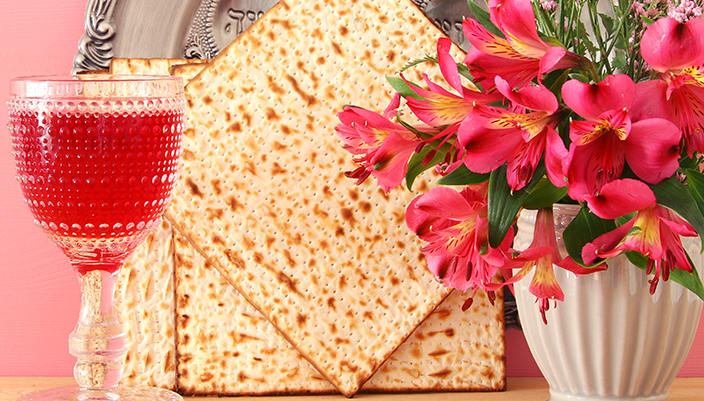
The Passover seder famously includes the drinking of four cups of wine, and even the charoset is often made with wine. According to Jewish law, we drink red wine at the Passover seder, but some families or communities choose to adapt their seder to their own tastes and use white wine and grape juice – which is good news for anyone who doesn’t drink or doesn’t want to, or for those who simply want to mix it up a little.
In honor of this custom, we’ve gotten a bit creative with the four cups of wine, diverging from the traditional red wine by sharing fun food and wine pairings for your Passover seder and beyond. And remember: Please indulge safely and responsibly!
Karpas (Greens) and Rosé
Karpas are the vegetables dipped in salt water to remind us of the tears the Israelites shed in Egypt during their time of slavery. Parsley is common, though veggies like celery, cucumbers, radish, and lettuce all work, too.
Karpas is the first solid food of the evening, and although it represents a very heavy piece of our Jewish history, the food itself is light and crisp – so we recommend pairing this crunchy vegetable with a similarly light, crisp rosé, which won’t fill you up right at the start of the night.
Maror (Bitter Herbs) and Wine Cooler
Maror is bitter, intended to remind us of the bitterness of our slavery in Egypt; usually, it’s a bitter herb like raw horseradish, though some people use romaine lettuce. Either way, there’s no way to sugarcoat this: Maror tastes bitter. That’s the point.
Once we’ve acknowledged yet another weighty piece of our history, we can wash away the taste of that ritual bitterness with a sweet wine cooler and start to breathe easy for the rest of the seder. (This is especially true after horseradish, which is quite the sinus-clearer!)
Shulchan Oreich (Festive Meal) and a Dark Red
Shulchan oreich, or “set table,” is the main meal. By this point in the seder, we’ve covered the history of the Exodus, the Four Questions, the Four Children, and a lot of fun singing. It’s time to dig in! Here, your wine pairings depend upon your entrees:
- If you’re having meat or chicken, pair your meal with a rich, dark red wine, like the ever-popular Cabernet Sauvignon.
- Chicken soup – a classic Ashkenazi Jewish staple – goes great with Chardonnay.
- If you’re sticking to stews, try a Merlot instead.
A note, though: While red wines are very versatile, they won’t pair well with everything. If you’re eating a briny, salty, or otherwise overpowering food, a Pinot Grigio will refresh your palate. If fish is your main course, pair it with a white wine instead, as the tannins in red wines don’t always pair well with seafood flavors.
Dessert and Sweet Whites
Desserts are usually sweet, so we recommend swapping out the bold reds you had during your main course for the light, bright whites. Sauvignon Blanc goes great with zesty citrus flavors, so bust this one out if you’re serving fruit salad. For cakes and pies, try a Chardonnay. Dried fruits and berries, however, will perfectly pair with a red, like a Red Zinfandel.
When in doubt, go for a sparkling wine, like prosecco, or a sweet white dessert wine. You can’t go wrong with double the desserts!
The Afikoman and… More Rosé
The is the final piece of matzah we eat at the end of the seder – even after we’ve had dessert. Matzah is essentially a wheat cracker (though soft matzah, which tastes a lot like plain wheat bread, is common among Jews of Sephardi and Mizrahi background). For that bread flavor, pair it with the same drink we started with: a nice rosé.
Congratulations! You’ve made it through the whole seder! Now it’s time to clean up… but we’ve got drink ideas for that portion of the evening, as well.
Gelatin Shots and the After-Party
After the meal has been eaten, the afikoman found, and the seder concluded, you may find yourself sitting around with friends and family, catching up in a more informal way. Manischewitz-based “Jell-O” shots make for a fun after-seder digestif while hanging out with your loved ones. Bonus: With a burst of sugar for late-night cleaning energy, they’ll also serve as a private pep-me-up after the guests have gone home and the clean-up awaits.
Jell-O isn’t kosher, but kosher, vegan, and gelatin-free mixes can be found online or in the kosher section of your grocery store, and agar (made from algae!) is a popular gelatin substitute that can be swapped out for gelatin in most recipes
Mimosas and Matzah Brei Brunch
Whether you wake up after your late-night seder feeling fresh or prefer to sleep in a bit, you’re sure to want a nice, light meal to start the new day – and the rest of the holiday.
Making Matzah brei, an eggs-and-matzah dish, is a time-honored Passover tradition. It’s delicious any time of day, but because it’s typically considered a breakfast food, the perfect brunch drink to pair it with is a mimosa, of course. Made with fresh squeezed orange juice and dry sparkling white wine, served cold, this quintessential brunch cocktail is a delightful pairing to pan-fresh, buttery matzah brei.
And finally, please remember: You are under no obligation to consume alcoholic beverages, at Passover or ever. In most cases, these pairing suggestions can be made non-alcoholic: flavored seltzer instead of rosé, grape juice instead of red wine, an orange-juice-and-ginger-ale combo instead of mimosas. No pressure!
Whatever you drink and however you celebrate, happy Passover – and l’chaim!
